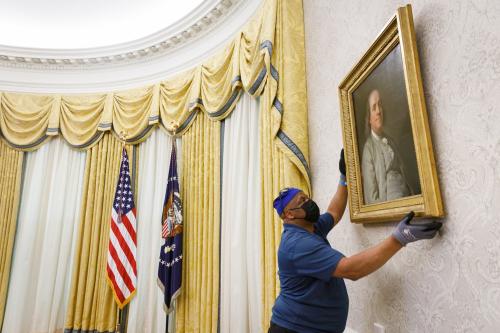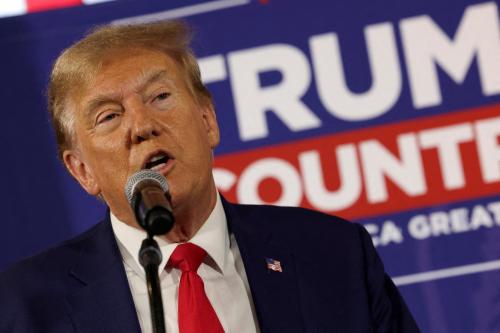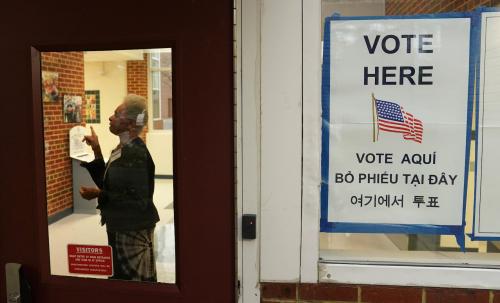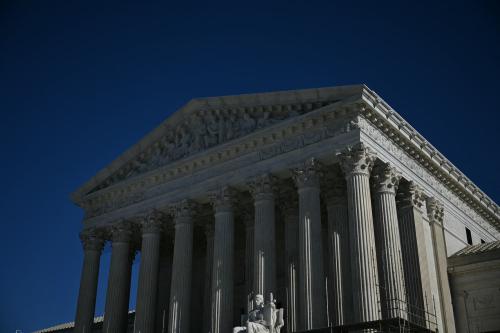Most presidential election years advance as follows. There are lots of primaries, someone in each party wins the most and takes center stage at a big raucous convention, they run in the general election, someone wins 270 votes in the Electoral College and becomes president.
But 2024 is no normal presidential election year. The two leading candidates for the major party nominations are the oldest pairing of candidates in American history — one is 81, the other is 77. Age appears to be a major factor in the fortunes of the incumbent president even though he has the kind of record that would re-elect most presidents. The other candidate is under indictment and could be convicted of a crime and head to jail in the election year. The two major parties are so closely divided that third party candidates could swing the Electoral College votes of a state — resulting in the third election in the 21st century where the national vote winner does not win the Electoral College vote and thus the presidency.
It is no wonder that lots of Americans are asking, “What happens if the candidate is incapacitated, drops out, goes to jail, or if no one reaches 270 in the Electoral College vote count?” The answer is that the election could be decided by approximately 10,000 people who no one has ever heard of.
So, here’s who they are.
First, we need to understand the importance of political parties. For example, a great deal of attention has been paid to the fact that officials in Colorado and Maine have recently decided that Trump is ineligible to appear on the Republican primary ballot in their state because of his role in the January 6 insurrection. If these decisions stand (a big if) it could have huge consequences in November but no consequences at all for the nomination race. That’s because political parties control the nomination process. They are covered by the First Amendment’s freedom of association and short of processes that violate other civil rights (all-white primaries, for instance) the state political parties can select delegates to their conventions pretty much any way they want to. The Republican parties of Colorado and Maine can elect delegates at their state convention or by their state committee and send them to Milwaukee to vote for Trump at the Republican convention.
This is just one example of the fundamental fact that from now until Election Day in November — the answer to 'What happens if…' is to be found in the internal rules and precedents of each of the major political parties.
For instance, in the event of the death or incapacitation of a candidate, each state party will continue to elect delegates to their conventions in a series of congressional district caucuses, state conventions, and state committee meetings that will occur most often in April, May. and June. Delegates elected in the name of someone who is no longer a candidate will become uncommitted. Candidates who step into the breach hoping to take the place of the fallen candidate will find out who these delegates are and woo them in as many ways as they can. The outcome will be a convention where the result may not be known ahead of time. In other words, it will be the kind of no-holds-barred event that nominating conventions held between 1831 and 1968.
All this is to say that the first 8,567 people you’ve never heard of are the people who will be delegates to the national conventions. These people can be teachers or labor union members or evangelical Christians or right to life activists. What they all have in common is some degree of activism on behalf of their political party, even if they generally are unknown to the public.
The dominant role of the political parties extends until after the convention as well. If something happens to the party’s nominee and that person can’t run in the general election, the 168 members of the Republican National Committee and 426 members of the Democratic National Committee will meet in special session to choose a replacement nominee. (No, the nomination does not automatically extend to the vice-presidential candidate on the ballot.) The procedures for this are written in the rules of the Republican Party and in the Charter of the Democratic Party. Most of these 594 people are elected in their states and include all the state party chairmen and vice chairmen as well as people who are prominent in their state and party.
Each party has a system of selecting its national committee members and its national convention delegates and methods for implementing the selection process. This is a large and complex undertaking, which is why it requires established political parties and millions of dollars to carry out. If one understands the centrality of the institutional party to the nomination process, one can also see why a group like No Labels is having such trouble figuring out how to nominate a candidate that (supposedly) the public wants and who is neither Trump nor Biden. Over many decades, the two political parties have established a system that has a kind of legitimacy to it. A group that decided to put forth a candidate without calling itself a political party and without building a grass roots of elected leaders will have a very hard time arguing that its nominee is legitimate.
And finally, what happens if, for some reason, the winner can’t take office after Election Day and before the final count in the Senate? The next critical group that no one knows consists of the 535 members of the Electoral College. Most people are familiar with the Electoral College and on election night we all watch as states announce who won and who lost their electors. But most people don’t realize that electors are actual real live people who travel to their state capitals on the first Tuesday after the second Wednesday in December. They have a real meeting where they sign a “certificate of ascertainment” and a “certificate of votes” which are sent to Washington, D.C. to be read and counted by the president of the Senate (the sitting vice president of the United States.) Some states (29) have statutes requiring the electors to vote for the winner of the election in that state. But others (21) do not.
Electors don’t often cast their votes differently from the election results. But in the case where the nominee is no longer alive, incapacitated, or on their way to jail, some of those electors may think differently and may try to vote for someone new. Electors are generally chosen by the state party for loyalty to the party. In many instances, it is an honor — a sort of gold watch — given for long-term service to the party. They are not expected to think for themselves or to negotiate, which is not to say that they wouldn’t under extraordinary circumstances.
And, of course, it is always possible that no candidates win 270 votes in the Electoral College. If that happens the election goes to 435 people in the House of Representatives. Some people know who their representative is but very few know who the other 434 representatives are. Once in the House — states have one vote each — determined by majority vote of their delegation — a crazy system in this day and age especially when the big states are so much more populous than the small states.
Once the Electoral College meets and makes its decision, if the winner can’t take office, the 20th Amendment to the Constitution states: “If, at the time fixed for the beginning of the term of the President, the President elected shall have died, the Vice President elect shall become President.”
Odds are that 2024 will proceed as expected. Trump and Biden will win the most primaries and be their party’s nominee. And one of them will go on to win the votes in the Electoral College and take control in January 2025. But it is important to understand that there are no guarantees 2024 will proceed along the usual course. There could be surprises along the way that will shock people and destabilize the system. The 8,567 convention delegates, the 594 members of the parties’ national committees, the 535 members of the Electoral College, and the 435 members of the House of Representatives add up to slightly more than 10,000 people. We are in uncharted waters on several fronts, and we should expect strange developments along the way. Ten thousand people who we don’t know could play a critical role in deciding how to deal with those surprises and determine the occupant of the most important office of the United States.
The Brookings Institution is committed to quality, independence, and impact.
We are supported by a diverse array of funders. In line with our values and policies, each Brookings publication represents the sole views of its author(s).








Commentary
Ten thousand people could decide the presidential election
January 3, 2024